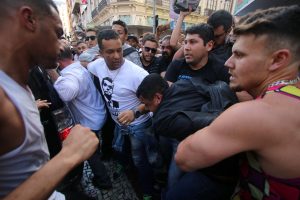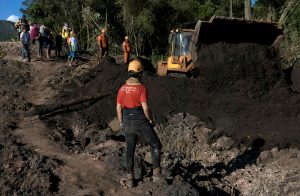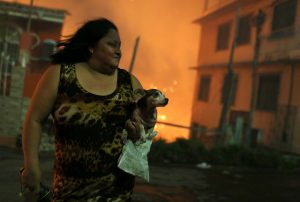
By Brad Brooks and Gabriel Stargardter
SAO PAULO/JUIZ DE FORA, Brazil (Reuters) – Brazil’s presidential campaign was thrown into chaos on Friday as the far-right front-runner was in serious condition after he was stabbed at a rally, just a month before the vote, raising fears of increased violence in the wide-open race.
Congressman Bolsonaro has angered many Brazilians by saying he would encourage police to ramp up their killing of suspected drug gang members and armed criminals, but he has a devoted following among conservative voters.

FILE PHOTO: Presidential candidate Jair Bolsonaro leaves an agribusiness fair in Esteio, Rio Grande do Sul state, Brazil August 29, 2018. REUTERS/Diego Vara/File photo
He could need two months to fully recover from Thursday’s attack and will spend at least a week in the hospital, following the life-threatening injuries, doctors said.
Bolsonaro was flown from Juiz de Fora in Minas Gerais state Friday morning, and is now in the Sirio Libanes hospital in Sao Paulo, one of the nation’s elite institutions.
Dr. Luiz Henrique Borsato, who operated on the candidate, said the internal wounds were “grave” and “put the patient’s life at risk” but that he was stable early Friday. Doctors were worried about an infection since Bolsonaro’s intestines were perforated, he added.
The knife reached 12 cm (4.7 inches) inside his abdomen and the candidate lost 2 liters (4.2 pints) of blood, the family said.
Meanwhile, fears of a flare-up in violence following the stabbing cast a shadow over Brazil on Friday as the nation celebrated Independence Day with political rallies expected in hundreds of cities.
Bolsonaro leads polling scenarios for the first-round vote on Oct. 7, but loses to most rivals in simulated run-off votes, which would take place on Oct. 28 if no candidate wins a majority in the first balloting.
Some analysts forecast that Bolsonaro could get a boost from the attack, a gruesome example of the violence he rails against, especially as support for his leftists rivals is split among three candidates.
Others, however, question if a such a polemical politician will gain any sympathy from voters who do not already back him.
Speaking from his hospital bed in Juiz de Fora in an online video, the retired Army captain compared the pain at first to being hit by the ball in a soccer game.

People surround a man suspected of stabbing Brazilian presidential candidate Jair Bolsonaro (not pictured) as he was campaigning in Juiz de Fora, Minas Gerais state, Brazil September 6, 2018. Felipe Couri / Minas Tribune / via REUTERS
“It was intolerable and it seemed like maybe something worse was happening,” he said, talking in a weak, raspy voice with a tube in his nose and monitors beeping nearby. “I was preparing for this sort of thing. You run risks.”
The attack on Bolsonaro, 63, is a twist in what was already Brazil’s most unpredictable election since the country’s return to democracy three decades ago. Scores of businessmen and politicians have been jailed in corruption investigations in recent years and alienated voters.
Imprisoned former President Luiz Inacio Lula da Silva would easily win the election, polls found, but he was barred from running because of his corruption conviction, scattering voter support among five main candidates.
Rival candidates called off campaign activities for Friday.
“YOU JUST ELECTED HIM PRESIDENT”
“I just want to send a message to the thugs who tried to ruin the life of a family man, a guy who is the hope for millions of Brazilians: You just elected him president. He will win in the first round,” Flavio Bolsonaro, Bolsonaro’s son, said on Friday.
His campaign could be hampered by not being able to hold street rallies. Under Brazil’s campaign laws, Bolsonaro’s tiny coalition has almost no campaign time on government-regulated candidate commercial blocs on television and radio. He must rely on social media and rallies around the country to drum up support.
Bolsonaro is running as the law-and-order candidate and has positioned himself as the anti-politician, though he has spent nearly three decades in Congress.
He has long espoused taking a radical stance on public security in Brazil, which has more homicides than any other country, according to United Nations statistics.
Bolsonaro, whose trademark pose at rallies is a “guns up” gesture holding both hands like pistols, has said he would encourage police to kill suspected drug gang members and other armed criminals with abandon.
He has openly praised Brazil’s military dictatorship and in the past said it should have killed more people.
Bolsonaro faces trial before the Supreme Court for speech that prosecutors said incited hate and rape. He has called the charges politically motivated.
His stabbing is the latest instance of political violence, which is particularly rampant at the local level. Earlier this year, Marielle Franco, a Rio city councilwoman who was an outspoken critic of police violence against slum residents, was assassinated.
Police video taken at a precinct and aired by TV Globo showed suspect Adelio Bispo de Oliveira telling police he had been ordered by God to carry out the attack.
One supporter camped outside Bolsonaro’s hospital room, Bruno Engler, 21, who is running for a Minas Gerais state congressional seat on Bolsonaro’s Social Liberal Party, said if he could, he would lynch the suspect.
“They call us on the right the intolerant, the violent ones, but those who are intolerant and violent are them,” Engler said, referring to leftist voters.
(Reporting by Brad Brooks in Sao Paulo and Gabriel Stargardter and Rodrigo Viga Gaier in Juiz de Fora; Writing by Brad Brooks and Alexandra Alper; Editing by Daniel Flynn and Jeffrey Benkoe)

















